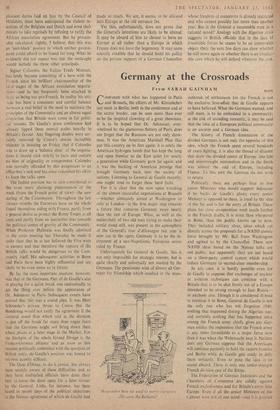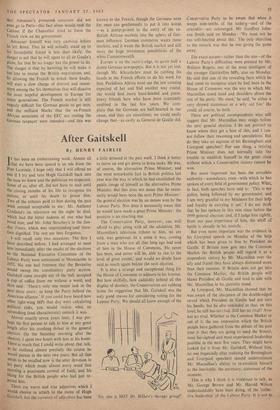Germany at the Crossroads
From SARAH GA1NHAM
BONN
OMPARED with what has happened in Paris and Brussels, the efforts of Mr. Khrushchev last week in Berlin, both in the conference and at the sector border, can be seen more than ever to be the inspired clowning of a great showman. It is to be hoped that Dr. Adenauer, over- whelmed by the glamorous flattery of Paris, does not forget that the Russians are not only show- men. It was the American Marshall Plan that put this country on its feet again; it is solely the American hydrogen bomb that has kept the long and open frontier to the East quiet for nearly a generation while Germany grew fat again; and it was the backing of American prestige that brought Germany back into the society of nations. Listening to General de Gaulle recently, one might tend to forget these hard facts.
For it is clear that the now open wrecking of the almost successful negotiations at Brussels --whether ultimately aimed at Washington or only at London—is the first major step towards a future that concerns Germany more nearly than the rest of Europe. What, as well as the melancholy of two old men trying to make their world stand still, was present in the atmosphere of the General's tour d'Allenzagne last year is now out in the open; Germany is to be the in- strument of a neo-Napoleonic European union ruled by France.
Unfortunately for General de Gaulle, this is not only impossible for strategic reasons, but is quite clearly and universally not wanted by the Germans. The passionate wish of almost all Ger- mans for friendship which resulted in the mass-
Rumumber how we used to worry ourselves silly over the Manus?' outbreak of enthusiasm for the French is not the exclusive love-affair that de Gaulle appears to have believed. What the Germans wanted, and .still want, is to be embedded in a community; at the risk of sounding romantic, it may be said that the idea of a European political community is an ancient and a German idea.
The history of French domination of the divided Germans is not only the opposite of this idea, which the French spent several hundreds of years fighting, it is also the thread of disaster that drew the divided centre of Europe into late and overwrought nationalism and in the finish was almost the end of Europe, including France. To this past the German do not wish to return.
Politically. there are perhaps four or live junior Ministers who would support Adenauer if he backs de Gaulle's plans; every senior Minister is opposed to them, is loyal to the idea of the Six and is for the entry of Britain. These plans for close co-operation went much further in the French drafts, it is more than whispered in Bonn, than the public knows up to now. They included military ideas, ideas which cut directly across the proposals for a NATO atomic force brought by Mr. Ball from Washington and agreed to by the Chancellor. These new NATO ideas based on the Nassau talks are not public, but apparently they are not based on a three-party control system which would reduce Germany to second-class membership.
In any case, it is hardly possible even for de Gaulle to suppose that exchanges of nuclear or aviation techniques can continue with a Britain that is to be shut firmly out of a Europe intended to be strong enough to face Russia-- or anybody else. Though it is considered ill-bred to mention it in Bonn, General de Gaulle is not the only one who has not forgotten 1940; nothing that happened during the Algerian war, and certainly nothing that has happened since among the French army chiefs, gives any Ger- man soldier the impression that the French army is any more formidable to a major force now than it was when the Wehrmacht beat it. Neither does any German suppose that the Americans will continue patiently to hold the eastern frontier and Berlin while de Gaulle gets ready to defy them seriously. Even to pose the idea is to sound absurd. There is only one under-strength French division east of the Rhine.
The Federation of German Industries and the Chambers of Commerce are solidly against French exclusiveness and for Britain's entry into Europe. Even if all the senior Ministers of the Cabinet were not of one mind—and it is pointed
that Adenauer's presumed successor did not even go to Paris—this fact alone would rock the Cabinet if the Chancellor tried to force the French view on his government.
Adenauer himself was very cautious before he left Bonn. That he will actually stand up to his formidable friend is less than likely; the, danger is not that he will agree to all de Gaulle's plans, for that he no longer has the power to do. The danger is that by havering he will make it too late to rescue the British negotiations and, by allowing the French to wreck them finally, will start a slow charge of distrust and resent- ment among the Six themselves that will dissolve the most hopeful development in Europe for many generations. The French market is still vaguely difficult for German goods to get into; and the milliard Marks that the ex-French African associates of the EEC are costing the German taxpayer were intended—and this was
known to the French, though the Germans were for once too gentlemanly to put it into words —as a pump-primer to the entry of the ex- British African markets into the sphere of Ger- man influence. German commerce wants those markets, and it wants the British market and still more the huge investment possibilities of the white Commonwealth.
Europe is on the razor's edge, to quote half a dozen German newspapers. But it is not yet lost, though Mr. Khrushchev must be rubbing his hands at the French efforts to do his work for him. Perfidious Albion must use the low cunning expected of her and find another way round; she would find many hard-headed and purse- heavy friends here who have been constantly snubbed in the last few years. We com- plain that the Germans are half-hearted in our cause, and they are sometimes; we could easily change that— as easily as General de Gaulle did.



































 Previous page
Previous page